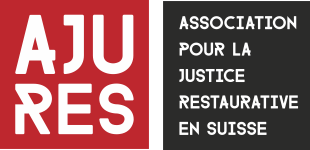Frequently Asked Questions
Here you will find answers to frequently asked questions about our organization and concepts related to restorative justice.
Organization
How can I get in touch?
To contact the organization, please send an e-mail to ajures@bluewin.ch indicating your first and last name and phone number.
How much does it cost and how can I pay?
The organization’s commitment is voluntary and it provides free mediation for all. However, if you are able and want to support us financially, know that the mediator’s work is paid. The total cost of a mediation depends very much on the particular case and in particular the number of necessary meetings, but it is generally between CHF 1,000 and CHF 1,500. The organization’s Bank information is 14-453018-0, IBAN CH52 0900 0000 1445 3018 0
Restorative justice
I am afraid to meet the perpetrator / victim. Can I still resort to restorative justice?
Yes. By contacting AJURES, you will first be in touch with a mediator who will explain the process. If, according to your wishes, the other party can be approached and shows an interest, the mediator will assess whether the conditions of contact are met and will discuss the most appropriate way to approach this contact with each party. Contacts can be made in person when possible, but also through different media such as a letter, a video, etc.
What can I gain from participating in a restorative justice process?
Above all, the ability to ask questions and to talk about how you feel. If the other party agrees to participate, we can get answers. Victims who participated often indicated that they were relieved to have met the perpetrator of the offense and that it gave them a more human picture, far from the all-powerful monster they had imagined. They feel relieved that they have been able to get answers to the questions they were concerned about and have been able to regain control of the situation. Offenders realize the extent of the damage suffered by their victim(s) and recover some of their dignity by offering some form of reparations (apologies, offering explanations or gifts). Even if the perpetrator or the victim does not always find what they hoped to receive, almost no one who has participated in such a process regrets it and many say they can finally turn over a new leaf or at least move on.
Can we ask for this form of justice before or after the trial?
This form of justice can be requested at any time, since it is based on the parties’ agreement. If the parties so wish and the process takes place before the trial, its result may be communicated to the criminal authorities, who are then free to take it into account or not during the trial. It should be noted, however, that this approach is not intended to have an impact on the trial so that both the perpetrator and the victim engage in this process in a sincere manner.
What if the victim/perpetrator does not want mediation?
Restorative justice processes can only occur with the agreement of all parties. Both the victim and the perpetrator can withdraw at any time, the mediator can also stop the process when conditions are no longer met. By contacting the organization, you will be put in contact with a mediator who will explain the process of mediation and what you can expect (or not expect). The other party may refuse and the process will stop there.
